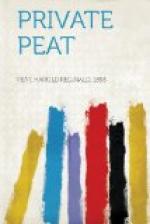With the most fervent thanks for the good work done on our western front, the authorities came to the conclusion that our cousins of the East would be even greater in service on one of our other fronts. They have gone since to Egypt, to Saloniki, to Mesopotamia, and to the East and West African fronts. They are playing a magnificent and unforgetable part in the world war. They have endeared themselves to the hearts of the folks at home and they have earned the lasting gratitude of all of us. They have defended their section of the empire as we have defended our northern part of the red splotches which mark Britain on the map.
I was sorry that the Indian regiments had to be removed from the west front, because, undoubtedly, they were the most feared by the Hun. The Indian was at his best in a charge, but at night he had an uneasy habit of crawling out of the trench toward Fritz, with his knife held firmly between his teeth. Before dawn he would return, his knife still in his teeth, but in his hand a German head.
To-day the Canadians in France are known by the enemy as the “white Ghurkas,” and this, to us, is one of the highest compliments. The Ghurkas are considered bravest of the brave. Shall we not be proud to share a title such as this?
As the religion of the Ghurka follows him to the battle-field, so in a different sense does the religion of the white man. We have our thoughts, our hopes and our aspirations. Some of us have our Bibles and our prayer-books, some of us have rosaries and crucifixes. All of us have deep in our hearts love, veneration and respect for the sky-pilot—chaplain, if you would rather call him so. To us sky-pilot, and very truly so, the man who not only points the way to higher things, but the man who travels with us over the rough road which leads to peace in our innermost selves.
It does not matter of what sect or of what denomination these men may be. Out on the battle-field there are Anglican clergy, there are Roman Catholic priests, there are ministers of the Presbyterian, the Methodist, the Baptist and other non-conformist faiths. Creed and doctrine play no part when men are gasping out a dying breath and the last message home. The chaplain carries in his heart the comfort for the man who is facing eternity. We do not want to die. We are all strong and full of life and hope and power of doing. Suddenly we are stricken beyond mortal aid. The chaplain comes and in a few phrases gives us the password, the sign which admits us to the peaceful Masonry of Christianity. Rough men pass away, hard men “go West” with a smile of peace upon their pain-tortured lips if the padre can get to them in time for the parting word, the cheerful, colloquial “best o’ luck.”
Does the padre come to us and sanctimoniously pronounce our eternal doom should he hear us swear? The clergyman, the minister of old time, is down and out when he reaches the battle-fields of France, or any other of the fronts we are holding. No stupid tracts are handed to us, no whining and groaning, no morbid comments on the possibility of eternal damnation. No, the chaplain of to-day is a real man, maybe he always was, I don’t know. A man who risks his life as do we who are in the fighting line. He has services, talks, addresses, but he never preaches. He practises all the time.




